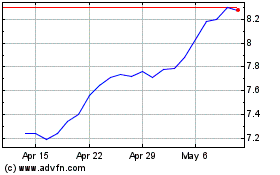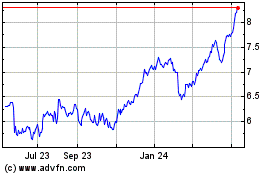Trump Administration Backs Madoff Trustee's Hunt for $3 Billion Foreign Loot
April 13 2020 - 1:15PM
Dow Jones News
By Andrew Scurria
The Justice Department is backing efforts to force European
banks and other overseas investors to give back roughly $3 billion
they received from foreign investment funds that moved money in and
out of Bernard Madoff's Ponzi scheme.
The U.S. solicitor general on Friday urged the U.S. Supreme
Court to pave the way for continued litigation against these
foreign institutions, some of the last remaining targets in the
global hunt for stolen cash from Mr. Madoff's $20 billion
fraud.
The nation's highest court is considering whether to take up an
appeal from banks and other foreign recipients that have been sued
by Irving Picard, the trustee who has spent more than a decade
digging up money for Mr. Madoff's victims. The dispute concerns Mr.
Picard's attempts to reclaim tainted money that passed between
foreign institutions before Mr. Madoff's arrest.
Mr. Picard has long insisted that under U.S. bankruptcy law, he
can recoup Ponzi scheme proceeds that were distributed from
offshore funds in the British Virgin Islands, Cayman Islands and
Bermuda. These feeder funds pooled investors' cash, parked most or
all of it with Mr. Madoff and collected proceeds from the Ponzi
scheme before it was exposed in 2008.
The trustee has recouped more than $13 billion over the past
decade, arguing that money withdrawn from Mr. Madoff's phantom
investment firm should help repay average investors who lost money
in the fraud. As part of his global legal campaign, Mr. Picard sued
the feeder funds for the money they collected and followed the cash
trail to their underlying investors.
Banks including HSBC Holdings PLC, Crédit Agricole SA and
Société Générale SA have said that transfers occurring entirely
outside the U.S. were beyond the trustee's reach. A New York
appeals court last year brought these transfers within Mr. Picard's
grasp, ruling that to declare them off-limits would disadvantage
legitimate creditors and encourage fraudsters to stash stolen
assets overseas.
The appellate ruling covered roughly $4 billion in foreign
transfers, but Mr. Picard subsequently reached a settlement with
two British Virgin Islands funds managed by Kingate Management Ltd.
that reduced the amount in dispute by $860 million.
The Supreme Court could either take up that decision for review
or cement it in place by denying the banks' appeal. If the justices
side with Mr. Picard, he would be able to continue suing the banks,
laying the groundwork for potential settlements that would bring
back more money for victims.
In Friday's court filing, the solicitor general said the lower
court was correct in focusing on the initial transfer of funds from
Mr. Madoff's New York bank accounts to the offshore funds to
justify clawing back the money, even if it was later passed between
two foreign firms. The justices sometimes ask for the solicitor
general's input on pending cases that could have a significant
impact on federal law.
Mr. Madoff is serving a 150-year prison sentence in North
Carolina after pleading guilty to running the largest Ponzi scheme
in history.
Write to Andrew Scurria at Andrew.Scurria@wsj.com
(END) Dow Jones Newswires
April 13, 2020 13:00 ET (17:00 GMT)
Copyright (c) 2020 Dow Jones & Company, Inc.
Credit Agricole (PK) (USOTC:CRARY)
Historical Stock Chart
From Jun 2024 to Jul 2024

Credit Agricole (PK) (USOTC:CRARY)
Historical Stock Chart
From Jul 2023 to Jul 2024
